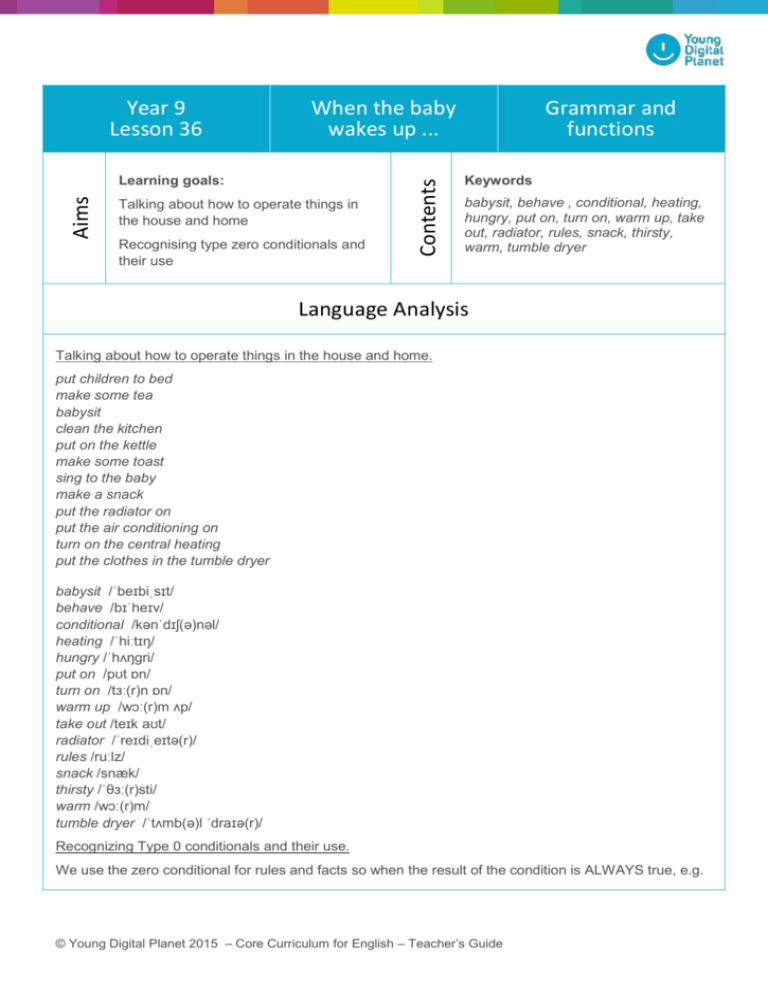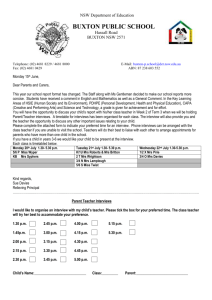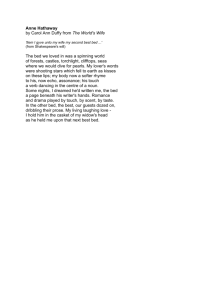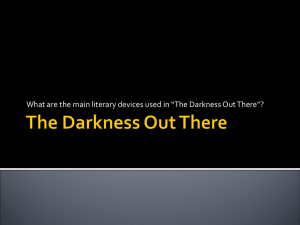Young Digital Planet 2015 – Core Curriculum for English
advertisement

When the baby wakes up ... Aims Learning goals: Talking about how to operate things in the house and home Recognising type zero conditionals and their use Contents Year 9 Lesson 36 Grammar and functions Keywords babysit, behave , conditional, heating, hungry, put on, turn on, warm up, take out, radiator, rules, snack, thirsty, warm, tumble dryer Language Analysis Talking about how to operate things in the house and home. put children to bed make some tea babysit clean the kitchen put on the kettle make some toast sing to the baby make a snack put the radiator on put the air conditioning on turn on the central heating put the clothes in the tumble dryer babysit /ˈbeɪbiˌsɪt/ behave /bɪˈheɪv/ conditional /kənˈdɪʃ(ə)nəl/ heating /ˈhiːtɪŋ/ hungry /ˈhʌŋɡri/ put on /pʊt ɒn/ turn on /tɜː(r)n ɒn/ warm up /wɔː(r)m ʌp/ take out /teɪk aʊt/ radiator /ˈreɪdiˌeɪtə(r)/ rules /ruːlz/ snack /snæk/ thirsty /ˈθɜː(r)sti/ warm /wɔː(r)m/ tumble dryer /ˈtʌmb(ə)l ˈdraɪə(r)/ Recognizing Type 0 conditionals and their use. We use the zero conditional for rules and facts so when the result of the condition is ALWAYS true, e.g. © Young Digital Planet 2015 – Core Curriculum for English – Teacher’s Guide scientific fact. We use the zero conditional to talk about possible actions and their results. In the condition clause we need to use present forms. In the result clause, there needs to be present tense or imperative. If clause result clause If + present simple, present simple If the children don't go back to bed quickly, they can't go to the cinema next week. Please note we can change the order of the sentences: If clause result clause present simple, if + present simple The children can't go to the cinema next week if they don't go to bed quickly. Unless = if not Unless is used for conditional sentences to mean if not e.g. Unless you really want, I will not cook dinner today. © Young Digital Planet 2015 – Core Curriculum for English – Teacher’s Guide Procedure Lead-in Key: babysitting Ask students: What do you think she is doing? Play the game. Give the Ss these instructions for the Hangman game. Hangman is a spelling game. The aim is to find the hidden word by guessing the letters. The alphabet is set out at the bottom of the screen. Look at the number of letters in the word. Guess the first letter, e.g. ‘e’. Guess the next letter and click it. Continue until you have guessed the word. © Young Digital Planet 2015 – Core Curriculum for English – Teacher’s Guide Main input Audio: Mrs Davies: Thanks very much Kerry, for coming to babysit. Kerry: That’s fine, Mrs Davies, you’re welcome. Mrs Davies: Now, the children are getting ready for bed. If the baby wakes up give him some milk. He likes it best if you warm it up in the microwave. Kerry: OK, Mrs Davies, don’t worry. When the baby wakes up I need to warm up some milk in the microwave for him. Mrs Davies: That’s right. Now, if the other children come downstairs again you need to tell them to go straight back to bed. And if they don’t go straight back to bed tell them they can’t go to the cinema next week. Kerry: OK, I need to tell them that if they don't go back to bed quickly they’re not going to the cinema next week. Mrs Davies: That’s right. Now if you’re hungry there are some biscuits in the fridge or if you prefer you can make yourself some toast in the toaster. Put the kettle on if you want to make a cup of tea or coffee. The milk is in the fridge if you take milk. The TV’s on, if you need to change channels use the remote control. Now you should be warm enough but if you are cold do put on the heating. You can turn it on at the radiator. If you get too hot, put on the air conditioning. If you press the button by the cupboard it comes on straight away. One last thing, please could you take out the washing from the washing machine when it finishes and put it in the tumble dryer. Now, let’s see is that everything? Oh, yes, here’s my mobile number. If you need anything just text me or give me a ring. Kerry: OK, that’s all fine don’t worry, enjoy yourselves. If I’m thirsty I can make myself a drink and If I’m hungry I can make myself a snack. And if it gets cold I can put on the radiator, and if I’m hot I can put on the air conditioning. And if I need Ask students to listen and choose the best answer. Extension: Ask students to look at the grammar box and study zero conditional examples. © Young Digital Planet 2015 – Core Curriculum for English – Teacher’s Guide anything I can text or ring you. Focus students’ attention on the sentences from the exercise and ask to point out to the tenses mentioned in the box. Key: 1 2 3 4 5 6 A to babysit. D Kerry has to warm him some milk in the microwave. D Kerry needs to put them back to bed. B make some toast or eat some biscuits. C she needs to put the clothes in the tumble dryer. B the air conditioning starts immediately. © Young Digital Planet 2015 – Core Curriculum for English – Teacher’s Guide Practice 1 Audio: Mrs Davies: Thanks very much, Kerry for coming to babysit. Kerry: That’s fine, Mrs Davies, you’re welcome. Mrs Davies: Now, the children are getting ready for bed. If the baby wakes up give him some milk. He likes it best if you warm it up in the microwave. Kerry: OK, Mrs Davies, don’t worry. When the baby wakes up I need to warm up some milk in the microwave for him. Mrs Davies: That’s right. Now, if the other children come downstairs again you need to tell them to go straight back to bed. And if they don’t go straight back to bed tell them they can’t go to the cinema next week. Kerry: OK, I need to tell them that if they don't go back to bed quickly they’re not going to the cinema next week. Mrs Davies: That’s right. Now if you’re hungry there are some biscuits in the fridge or if you prefer you can make yourself some toast in the toaster. Put the kettle on if you want to make a cup of tea or coffee. The milk is in the fridge if you take milk. The TV’s on, if you need to change channels use the remote control. Now you should be warm enough, but if you are cold do put on the heating. You can turn it on at the radiator. If you get too hot, put on the air conditioning. If you press the button by the cupboard it comes on straight away. One last thing, please could you take out the washing from the washing machine when it finishes and put it in the tumble dryer? Now, let’s see is that everything? Oh, yes, here’s my mobile number. If you need anything just text me or give me a ring. Ask students to listen and choose True or False. Extension: Exploit the screen by asking students to correct the false sentences. 1 False If the baby wakes up give him some milk. 4 False You need to use the remote control when you change the channel. 5 False Eat food if you are hungry. 6 False Drink if you are thirsty. Kerry: OK, that’s all fine don’t worry, enjoy yourselves. If I’m thirsty I can make myself a drink and If I’m hungry I can make myself a snack. And if it gets cold I can put on the radiator, and if I’m hot I can put on the air conditioning. And if I need © Young Digital Planet 2015 – Core Curriculum for English – Teacher’s Guide anything I can text or ring you. Key: 1 False 2 True 3 True 4 False 5 False 6 False 7 True 8 True © Young Digital Planet 2015 – Core Curriculum for English – Teacher’s Guide Practice 2 Key: 1 2 3 4 5 6 If the baby wakes up warm some milk in the microwave. Put on the air conditioning if you are hot. If you are cold put on the central heating. Put on the washing in the tumble dryer if it finishes. If the children are asleep, you can watch the TV. You can change the TV channel if you can find the remote control. Ask students to read and match the two parts of the conditional sentences. Extension: Ask students to look at the left side of the screen only (or cover the right side) and ask students to finish the sentences. In weaker groups as students to finish the sentences as they were originally. In stronger groups, encourage students to come up with new and original endings. Give out the Handouts. Ask students to match the words to make phrases. © Young Digital Planet 2015 – Core Curriculum for English – Teacher’s Guide Key: 1 2 3 4 5 6 7 8 9 10 11 12 E put children to bed B be asleep G make some tea A clean the kitchen I put on the kettle C make some toast H sing to the baby K make a snack D put the radiator on J put the air conditioning on F turn on the central heating L put the clothes in the © Young Digital Planet 2015 – Core Curriculum for English – Teacher’s Guide Practice 3 Audio: Mrs Davies: Thanks very much, Kerry, for coming to babysit. Kerry: That’s fine Mrs Davies, you’re welcome. Mrs Davies: Now, the children are getting ready for bed. If the baby wakes up give him some milk. He likes it best if you warm it up in the microwave. Kerry: OK, Mrs Davies, don’t worry. When the baby wakes up I need to warm up some milk in the microwave for him. Mrs Davies: That’s right. Now, if the other children come downstairs again you need to tell them to go straight back to bed. And if they don’t go straight back to bed tell them they can’t go to the cinema next week. Kerry: OK, I need to tell them that if they don't go back to bed quickly they’re not going to the cinema next week. Mrs Davies: That’s right. Now if you’re hungry there are some biscuits in the fridge or if you prefer you can make yourself some toast in the toaster. Put the kettle on if you want to make a cup of tea or coffee. The milk is in the fridge if you take milk. The TV’s on, if you need to change channels use the remote control. Now you should be warm enough but if you are cold do put on the heating. You can turn it on at the radiator. If you get too hot, put on the air conditioning. If you press the button by the cupboard it comes on straight away. One last thing, please could you take out the washing from the washing machine when it finishes and put it in the tumble dryer? Now, let’s see is that everything? Oh, yes, here’s my mobile number. If you need anything just text me or give me a ring. Ask students to write the correct verb form in the zero conditional sentences. Extension: Ask students to look at the sentences again and point to the if-clause. Tell students to change the sentences into negative e.g. If she wants a cup of tea, she has to put on the kettle. If she does not want a cup of tea, she does not need to put on the kettle. Kerry: OK, that’s all fine don’t worry, enjoy yourselves. If I’m thirsty I can make myself a drink and If I’m hungry I can make myself a snack. And if it gets cold I can put on the radiator, and if I’m hot I can put on the air conditioning. And if I need © Young Digital Planet 2015 – Core Curriculum for English – Teacher’s Guide anything I can text or ring you. Key: 1 2 3 4 5 6 wants, has wakes up, needs needs, needs finishes, has gets, can ring, needs © Young Digital Planet 2015 – Core Curriculum for English – Teacher’s Guide Practice 4 Key: 1 2 3 4 5 6 Bread goes brown if you put it in a toaster. Water boils if you turn on a kettle. The room becomes hotter if you put the radiator on. The room becomes cooler if you put on the air conditioning. If you put dirty clothes in a washing machine, they become clean. If you put wet clothes in a tumble dryer they become dry. Ask students to make zero conditional sentences with the words. Extension: Write the following beginning of the sentences and ask students to finish them up: Encourage students to come up with new endings. 1 2 3 4 5 6 Bread goes brown if ... Water boils if you ... The room becomes hotter if… The room becomes cooler if… If you put dirty clothes in a washing machine, … If you put wet clothes in a tumble dryer they… © Young Digital Planet 2015 – Core Curriculum for English – Teacher’s Guide English to take away Key: Student’s own answers. This is a ‘free practice’ stage. The aim is personalisation. Give students the following instructions: Work in pairs. Have a conversation about babysitting. One student is the babysitter and the other is the parent. Student A: You are the children's mum or dad. • Thank B for babysitting. • Say what to do if the baby wakes up. • Say what to do if the other children come downstairs. • Say what to do if the babysitter is: hungry / thirsty / cold / hot. (Explain how to use some of the kitchen appliances.) Student B: You are the babysitter. • Say that you are happy to babysit. • Ask what do if the baby wakes up. (Use zero conditionals.) • Ask what to do if the other children come downstairs. © Young Digital Planet 2015 – Core Curriculum for English – Teacher’s Guide Handout 1 put children to 2 be 3 make some 4 clean the 5 put on the 6 make some 7 sing 8 make 9 put the 10 put the air 11 turn on the central 12 put the clothes in the tumble A. kitchen B. asleep C. toast D. radiator on E. bed F. heating G. tea H. to the baby I. kettle J. conditioning on K. a snack L. dryer © Young Digital Planet 2015 – Core Curriculum for English – Teacher’s Guide






